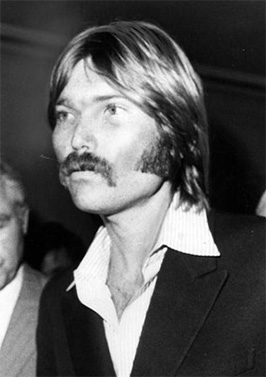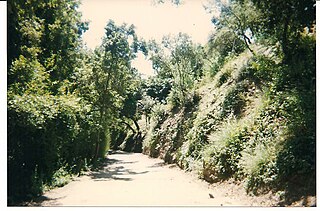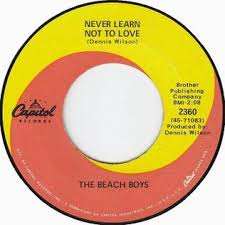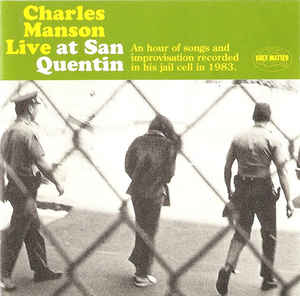
Charles Milles Manson was an American criminal, cult leader and musician who led the Manson Family, a cult based in California, in the late 1960s. Some of the members committed a series of at least nine murders at four locations in July and August 1969. In 1971, Manson was convicted of first-degree murder and conspiracy to commit murder for the deaths of seven people, including the film actress Sharon Tate. The prosecution contended that, while Manson never directly ordered the murders, his ideology constituted an overt act of conspiracy.

Lie: The Love and Terror Cult is the debut studio album by American musician and convicted murderer Charles Manson. It was released on vinyl on March 6, 1970, by Phil Kaufman, through a record label branded Awareness Records. Although not a commercial success, it retains a following among those interested in the Manson case, inspiring many cover versions and samples. The album includes some of Manson's best known songs, including "Look at Your Game, Girl" and "Cease to Exist".

Dennis Carl Wilson was an American musician who co-founded the Beach Boys. He is best remembered as their drummer and as the middle brother of bandmates Brian and Carl Wilson. Dennis was the only true surfer in the Beach Boys, and his personal life exemplified the "California Myth" that the band's early songs often celebrated. He was also known for his association with the Manson Family and for co-starring in the 1971 film Two-Lane Blacktop.

Patricia Dianne Krenwinkel is an American convicted murderer and former member of the Manson Family. During her time with Manson's group, she was known by various aliases such as Big Patty, Yellow, Marnie Reeves and Mary Ann Scott, but to The Family, she was most commonly known as Katie.

Susan Denise Atkins was an American convicted murderer who was a member of Charles Manson's "Family". Manson's followers committed a series of nine murders at four locations in California over a period of five weeks in the summer of 1969. Known within the Manson family as Sadie, Sadie Glutz, Sadie Mae Glutz or Sexy Sadie, Atkins was convicted for her participation in eight of these killings, including the most notorious, the Tate murders in 1969. She was sentenced to death, which was subsequently commuted to life imprisonment when the California Supreme Court invalidated all death sentences issued prior to 1972. Atkins was incarcerated until her death in 2009. At the time of her death, she was California's longest-serving female inmate, long since surpassed by fellow Manson family members Leslie Van Houten and Patricia Krenwinkel.

Leslie Louise Van Houten is an American convicted murderer and former member of the Manson Family. During her time with Manson's group, she was known by aliases such as Louella Alexandria, Leslie Marie Sankston, Linda Sue Owens and Lulu.

The Manson Family was a commune, gang, and cult led by criminal Charles Manson that was active in California in the late 1960s and early 1970s. The group at its peak consisted of approximately 100 followers, who lived an unconventional lifestyle, frequently using psychoactive drugs, including amphetamine and hallucinogens such as LSD. Most were young women from middle-class backgrounds, many of whom were attracted by hippie counterculture and communal living, and then radicalized by Manson's teachings. The group murdered at least 9 people, though they may have killed as many as 24.

"Helter Skelter" is a song by the English rock band the Beatles from their 1968 album The Beatles. It was written by Paul McCartney and credited to Lennon–McCartney. The song was McCartney's attempt to create a sound as loud and dirty as possible. It is regarded as a key influence in the early development of heavy metal. In 1976, the song was released as the B-side of "Got to Get You into My Life" in the United States, to promote the Capitol Records compilation Rock 'n' Roll Music.
Linda Darlene Kasabian was an American woman known for being a member of the Manson Family, a cult led by Charles Manson in late-1960s–early-1970s California. She was present at both the Tate and LaBianca murders committed by the cult in 1969, but received immunity for her testimony as a key witness in District Attorney Vincent Bugliosi's prosecution of Manson and his followers.

20/20 is the 15th studio album by the American rock band the Beach Boys, released February 10, 1969 on Capitol Records. The LP was named for being their 20th overall release when factoring in live albums and compilations. Much of 20/20 consists of outtakes from earlier albums. It reached number 3 on UK record charts and number 68 in the U.S. Brian Wilson was absent during most of the album's recording after admitting himself into a psychiatric hospital, requiring brothers Carl and Dennis to retrieve several outtakes he had recorded years earlier. While Brian does not appear on the front cover, the inner gatefold of the original vinyl release features him alone, behind an eye examination chart.

Charles Manson Superstar is a documentary film about Charles Manson, directed by Nikolas Schreck in 1989. Most of the documentary was filmed inside San Quentin Prison. Nikolas and Zeena Schreck narrated the segments while images were shown, and music played in the background. There was brief footage of Spahn Ranch, and a short clip of James Nolan Mason being interviewed about the Universal Order, and Manson. Olivier Messiaen's "Death and Resurrection," Bobby Beausoleil's "Lucifer Rising," Krzysztof Penderecki's "Apocalypsis," Biff Rose's "Fill Your Heart" and Anton LaVey's "The Satanic Mass," and Manson's own songs "Clang Bang Clang" and "Mechanical Man" from the album Lie: The Love and Terror Cult, were played during the film.

Terrence Paul Melcher was an American record producer who was instrumental in shaping the mid-to-late 1960s California Sound and folk rock movements. His best-known contributions were producing the Byrds' first two albums Mr. Tambourine Man (1965) and Turn! Turn! Turn! (1965), as well as most of the hit recordings of Paul Revere & the Raiders and Gentle Soul. He is also known for his collaborations with Bruce Johnston and for his association with the Manson Family.

10050 Cielo Drive was the street address of a former luxury home in Benedict Canyon, in the west-central part of the Beverly Crest neighborhood of Los Angeles, bordering Beverly Hills, where three members of the Manson Family committed the Tate murders in 1969.

"Piggies" is a song by the English rock band the Beatles from their 1968 album The Beatles. Written by George Harrison as a social commentary, the song serves as an Orwellian satire on greed and consumerism. Among several elements it incorporates from classical music, the track features harpsichord and orchestral strings in the baroque pop style, which are contrasted by Harrison's acerbic lyrics and the sound of grunting pigs. Although credited to George Martin, the recording was largely produced by Chris Thomas, who also contributed the harpsichord part.

Spahn Ranch, also known as the Spahn Movie Ranch, was a 55-acre movie ranch in Los Angeles, California. For a period it was used as a ranch, dairy farm and later movie set during the era of westerns. After a decline in use for filming by the 1950s, its owner George Spahn established a stable for renting horses for riding on the varied acres. It became known in the late 20th century as the primary headquarters of Charles Manson and his cult followers, the "Manson Family", for much of 1967 and 1968. They were notorious for the Tate–LaBianca murders of August 1969.

"Never Learn Not to Love" is a song recorded by the American rock band the Beach Boys that was issued as the B-side to their "Bluebirds over the Mountain" single on December 2, 1968. Credited to Dennis Wilson, the song is an altered version of "Cease to Exist", written by the Manson Family cult leader Charles Manson. The blues-inspired song was written specifically for the Beach Boys, with Manson's lyrics addressing personal tensions that he had witnessed between Dennis and his brothers Brian and Carl.
"Look at Your Game, Girl" is a song written by Charles Manson from his album Lie: The Love and Terror Cult (1970). A folk rock and psychedelic folk ballad about a confused young woman, the song was included on a tape that Manson sent to record companies. His version of the song received mostly positive reviews from critics, who felt that the track had musical merit and drew connections between its lyrics and the ways in which Manson manipulated his followers.
Several recordings by Charles Manson and members of his "Family" have been released since Manson was indicted in late 1969 for the murders of Tate and LaBianca.

The Tate–LaBianca murders were a series of murders perpetrated by members of the Manson Family during August 9–10, 1969, in Los Angeles, California, United States, under the direction of Tex Watson and Charles Manson. The perpetrators killed five people on the night of August 8–9: pregnant actress Sharon Tate and her companions Jay Sebring, Abigail Folger, and Wojciech Frykowski, along with Steven Parent. The following evening, the Family also murdered supermarket executive Leno LaBianca and his wife, Rosemary, at their home in the Los Feliz section of Los Angeles.

Live at San Quentin is a bootleg album by American folk musician and convicted murder-conspirator Charles Manson, and was released on Grey Matter Records, in 1993. The album consists of live recordings produced by Manson directly from his cell in the California Medical Facility in 1983. As a result, the tracks suffer from poor sound quality, and various noises from the penitentiary interject throughout the album. All of the material on Live at San Quentin was distributed earlier on the rare cassette White Rasta.














